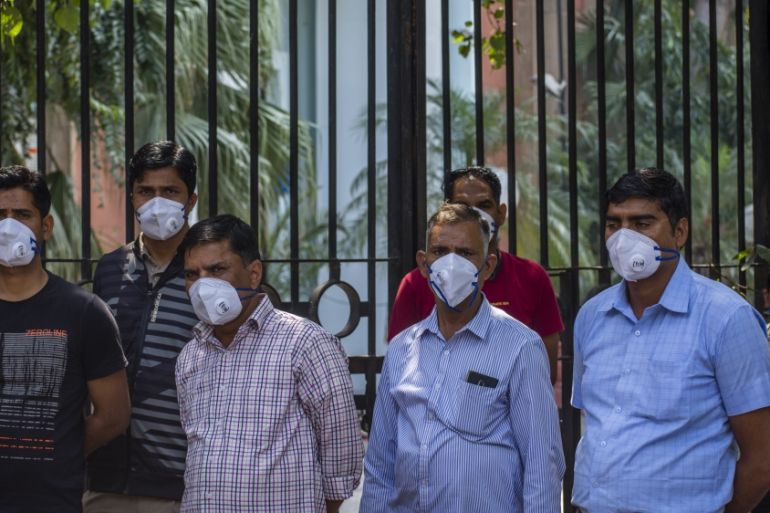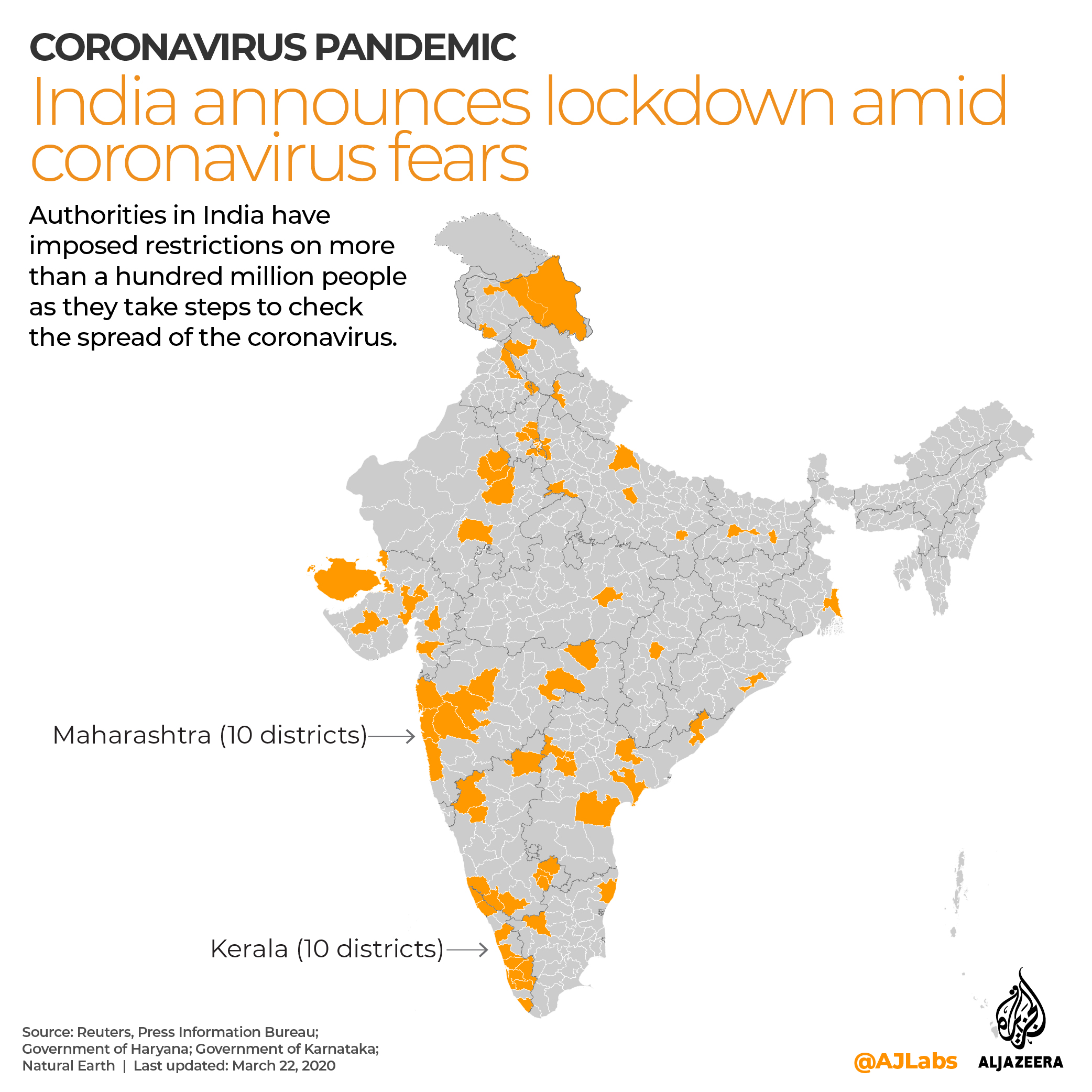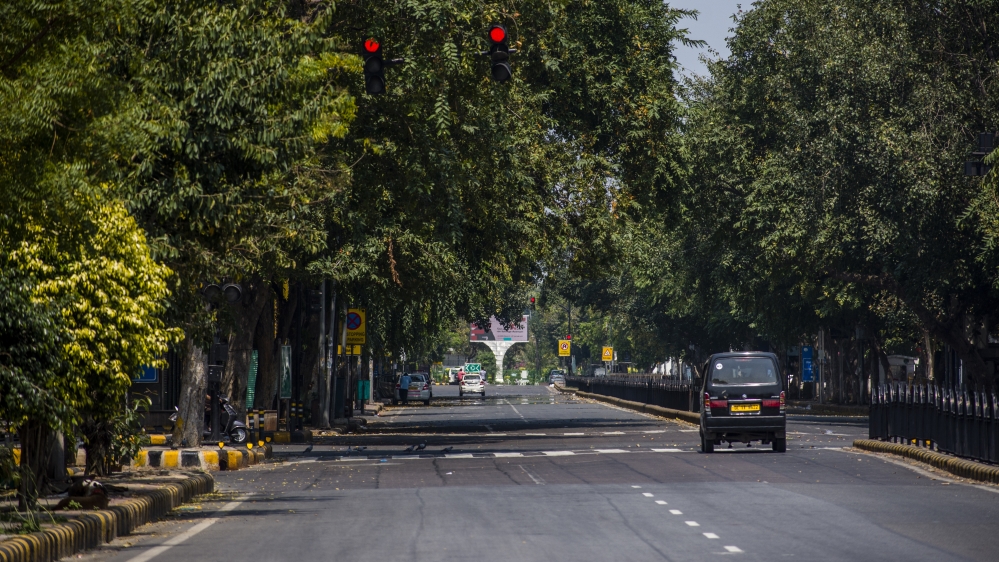India locks down over 100 million people amid coronavirus fears
The capital New Delhi and over 80 cities and districts shut down as India scrambles to check spread of the pandemic.

Authorities in India have placed more than 80 cities and districts across the country under stringent lockdown after cases of coronavirus were detected there, as the world’s second-most populous nation stepped up measures to halt the spread of the pandemic.
“State governments will issue orders allowing only essential services to operate in about 75 districts with confirmed COVID-19 cases or casualties,” said a home ministry official in New Delhi on Sunday.
Keep reading
list of 3 itemsTo get through coronavirus lockdown, we need basic income
Coronavirus: Travel restrictions, border shutdowns by country
The state shutdowns came during a 14-hour voluntary curfew that Prime Minister Narendra Modi said would test India’s ability to fight the pandemic.

“This is the start of a long fight,” Modi tweeted as the curfew came to an end and people came out onto their balconies and stood near open windows to clap, bang on metal vessels and ring bells to cheer emergency workers battling the spread of the coronavirus.
On Monday, Modi said many Indians were not taking the lockdown seriously. “Please save yourself, save your family, follow the instructions seriously,” he said on Twitter.
Al Jazeera’s Elizabeth Puranam, reporting from New Delhi, said pretty much all the major cities around the country are in lockdown along with 75 districts, which make up about 10 percent of the country’s population.
“No one is being allowed to go out unless they work in essential services such as healthcare,” she said.
“All inter-state buses have cancelled, so have metro services around the country.”
Al Jazeera’s correspondent said a large number of migrant workers are stranded at bus stations in big cities as they are trying to get back to their respective home towns.
New Delhi’s borders sealed
Normally bustling streets in the capital New Delhi and financial hub Mumbai were mostly deserted as many people stayed indoors.
A growing number of states and territories, including the capital New Delhi, banned all activity except for essential services.
Authorities banned gatherings of more than five people in several of India’s states, including Maharashtra in the west, which has had the highest number of cases. They warned of legal action against people violating the ban.
Newspapers cancelled print runs in Mumbai after vendors refused to distribute them due to worry about the coronavirus, which emerged in China late last year and has spread around the world.
More than 300,000 people have been infected worldwide, with the death toll topping 14,000.

New Delhi, with a population of almost 20 million, will seal its land borders from early Monday, and close shops and private sector offices until March 31.
“We have learned this from the world, that the less you venture outside, the less you come in contact with the world, that much we can save ourselves,” Delhi Chief Minister Arvind Kejriwal told reporters.
Other states imposed partial or full lockdowns, with many closing borders, restricting movement and halting most public transport. Some, like West Bengal, which has a population of more than 90 million, locked down major cities but not rural areas.
The Indian government on Monday announced to ground all domestic flights. Indian Railways, which carries more than 25 million commuters a day, cancelled all passenger train services until March 31.
Incoming international flights were already barred for a week, while schools, entertainment facilities and monuments such as the iconic Taj Mahal have been closed.
India has registered 417 cases of coronavirus, with seven deaths, according to the latest numbers reported in the media.
Lack of testing facilities
Experts have said the number of cases mirror rates during the early stages of the outbreak in other countries, which then went on to see very rapid growth.
Medical experts say a shortage of testing facilities could be hiding the true extent of cases in India, which has a population of more than 1.3 billion people.
Testing for the virus has been expanded to private laboratories and will now include asymptomatic people who had contact with confirmed cases, officials said.
Firefighters in western India fumigated areas around closed markets, public squares and urban slum districts.
“The curfew period gave us a chance to scale down each and every activity across India,” said a senior aide to Modi, adding that a more rigid approach could trigger protests or unrest.
Factories, large industrial parks and banks have declared shutdowns or found ways to minimise contact in offices.
Confirmed cases in South Asia, including India, have increased to 1,145 with 16 deaths reported. In Pakistan, nearly 800 people have been infected with the virus and six have died, while Bangladesh has seen the deaths of two people.
In Sri Lanka, police arrested more than 1,000 people for violating a curfew. The country has registered over 80 cases.
Afghanistan, with 40 cases, reported its first death from the coronavirus on Sunday.
